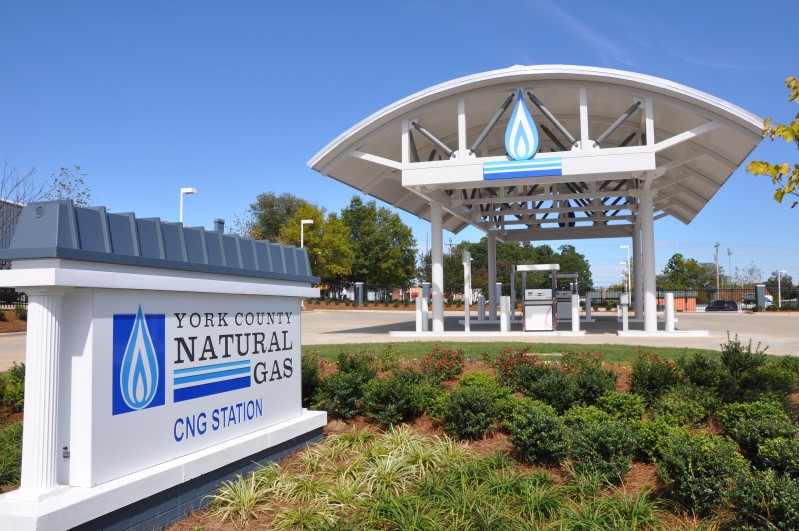Public or private vehicle fleets (e.g., police, public works, utility company, delivery vans) equipped to operate with bio-diesel, hybrid, electric, or other cleaner fuel sources that emit less pollutants into the air we breathe every day.
Why is this important to your community?
North Carolina and South Carolina have a larger share of carbon emissions that come from transportation than the national average. Counties in the CONNECT region are the only counties in North Carolina that failed to meet the 2008 health-based ozone standard set by the federal Clean Air Act. One of the region’s priorities is to improve air quality to support better public health. However, only 22% of local governments in the CONNECT region are currently implementing some type of “clean fleet” policy to reduce emissions and fuel usage. Given that we are one of the fastest growing regions in the country, without collective implementation of additional changes to how we operate our vehicles (and our buildings), our air quality is not likely to improve. In addition to improving air quality by reducing emissions, switching to a clean fleet can also save fuel costs.
Skip directly to
How Does It Work?
Resources
Using the Tool
Partners
Where Has It Worked?
Where is it appropriate to use?
What priorities does it address?
What other tools are related?
How does it work?
A number of strategies can be employed to reduce air pollution and emissions. Transitioning to cleaner fuel fleets, including bio-diesel, hybrid, or electric vehicles, can support improved air quality and represent long-term cost savings for private organizations andlocal governments. In the CONNECT region, there are two state coalitions – the Centralina Clean Fuels Coalition and the Palmetto State Clean Fuels Coalition – that provide technical assistance and grants through the DOE Clean Cities program.
Resources
- CONNECT Climate Change Planning Assessment (link to Air Quality WG Report)
- Multi-Alternative Fueling Station Feasibility Study
- Clean Air Carolina
- Centralina Clean Fuels Coalition
- NC Clean Energy Technology Center
- EPA Green Vehicle Guide
Ready to get started?
Using the Tool
- Develop a policy statement, if not already existing, that states the intention of the local government or organization to transition to clean fuel fleets. Consider linkages between clean fuels and other programs in which your local government or organization may already be involved (e.g., energy efficiency retrofits).
- Determine a point person to assess existing fleet services.
- Reach out to other communities with a track record in transitioning to clean fuel fleets (e.g., Rock Hill, SC) and connect with resources offering technical assistance such as the Centralina Clean Fuels Coalition (CCFC) (4cleanfuels.com/resources) who will compile analysis on current fuel usage, existing vehicles, emissions, and costs into a report with cost effective alternatives.
- There are also a number of tools available to assess existing use and potential cost savings through DOE http://www.afdc.energy.gov/tools.
- Review alternatives, and consider location of existing fuel stations. (DOE’s Alternative Fuels Data Center provides a map-based inventory of alternative fuel stations by state and type of fuel: afdc.energy.gov/locator/stations/). Be sure to involve facilities managers, transportation managers, and state coalitions (NC Clean Energy Technology Center, Palmetto State Clean Fuels) in the process of reviewing alternatives.
- Determine feasibility of fleet conversion, including a plan for phasing of improvements and capital costs, as well as the need or potential for additional fueling stations in the location of the organization.
- Contact the Centralina Clean Fuels Coalition for assistance with policy and marketing support, such as identifying alt fuels tax credits, rebates, incentives, or grants for transitioning fleets, as well as public awareness materials.At the municipal level, increase public awareness of local success stories in reducing emissions and costs. Share resources that may be applicable to private citizens and businesses including state loan programs, technical assistance, and location of existing alternative fuel stations in the region through the community’s website and communication materials.
Partners
- Advocacy Groups
- Airports
- Businesses / Business Associations
- Colleges and Universities
- Departments of Education / School Districts
- Elected Officials
- MPOs, RPOs, and COGs
- Municipal Departments
Where has it worked?
City of Rock Hill - Rock Hill, SC
About the Program
In the late 1990s, the City of Rock Hill transitioned their fleet to bio-diesel fuel. Then in 2005, with assistance from an EPA grant and a partnership with York Technical College, the City of Rock Hill was able to expand the program to retrofit existing vehicle equipment to further reduce emissions. Since then, the City has continued to expand its alternative energy fleet to 1,227 pieces of equipment including approximately 264 vehicles operating on bio-diesel (B-20), a blend of biodiesel and diesel, or compressed natural gas (CNG) and six electric cars. As a result, the City won the Palmetto State’s Greenest Fleet Award in 2010.
Why it works
In addition to switching to a clean air fleet, the City has implemented a number of energy efficient and cost saving measures in an effort to set a positive example for the community and increase environmental awareness. These measures include 16 electric car charging stations for public use, a no-idle policy, public fuel stations carrying B-20 and CNG tanks, LED stoplights, and a comprehensive recycling program. In testing a number of alternatives to fossil fuels, the City found that B-20 fuel represents significant environmental savings by reducing a vehicles’ black cloud by 90 percent, but tends to be more expensive than traditional fuel. However, CNG fueled vehicles represent significant cost savings at only $1.36 per gallon of fuel. Since making alternative fuels readily available to the public at the York County Natural Gas CNG Station, Burns Automotive, a local car dealership in Rock Hill has started selling and servicing CNG vehicles.
http://www.heraldonline.com/2012/04/22/3913835/rock-hill-works-hard-at-being.html
Climate Change Planning Assessment (link to Air Quality WG Report)
- Airports



